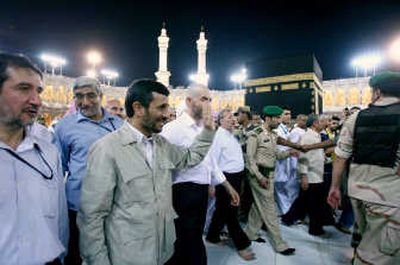U.S. cites Iran as bombings in Iraq decline

WASHINGTON – The Iranian government has decided “at the most senior levels” to rein in the violent Shiite militias it supports in Iraq, a move reflected in a sharp decrease in sophisticated roadside bomb attacks over the past several months, according to the State Department’s top official on Iraq.
Tehran’s decision does not necessarily mean the flow of those weapons from Iran has stopped, but the decline in their use and in overall attacks “has to be attributed to an Iranian policy decision,” said David Satterfield, Iraq coordinator and senior adviser to Secretary of State Condoleezza Rice. U.S. Ambassador to Iraq Ryan Crocker said the decision, “should (Tehran) choose to corroborate it in a direct fashion,” would be “a good beginning” for a fourth round of talks between Crocker and his Iranian counterpart in Baghdad. Although the mid-December date scheduled for the talks was postponed, Crocker said he expects the parties will convene “in the next couple of weeks.”
The Pentagon has been more cautious in describing Iran’s role in changes on the ground in Iraq. A Defense Department report released Wednesday emphasized that support for militia groups by Tehran’s Shiite government remains “a significant impediment to progress.” And Defense Secretary Robert Gates said Friday “the jury is out” on whether Iran is playing a less-destructive role.
“There has been a reduction in … attacks,” Gates said, but it remains uncertain whether the decrease is a result of U.S. and Iraqi actions “or whether the Iranians have begun to reduce the level of support. … We don’t have a good feeling or any confidence in terms of how to weigh those different things.”
One U.S. official, familiar with intelligence reports on Iraq but unwilling to be identified by name or agency, said the conclusion that a high-level policy decision was made in Tehran is “in the strike zone” of intelligence assessments. Iran “would definitely like to maintain some degree of influence over the militias” and other players in Iraq, the official said. Iran remains deeply involved in Iraqi political and economic affairs.
The Bush administration has said Iran maintains a widespread intelligence network in Iraq, with blurred lines between political operatives and those with direct involvement in militia violence. Rather than lessening its influence in Iraq, the official said, Iran has opted for “a creative shift in tactics” as violent militia action – some of it directed against Shiites – has turned many Iraqis against them.
Satterfield agreed that Iran was not acting out of “altruism,” but rather from “alarm at what was being done by the groups they were backing in terms of their own long-term interests.”
At a news conference Friday, Rice sidestepped an opportunity to criticize Iran. The United States, she said, remains “open to better relations” with Iran, adding, “We don’t have permanent enemies.”
The administration has long been reluctant to ascribe anything but malevolent motives to Tehran. Although a National Intelligence Estimate released early this month concluded that Iran stopped its nuclear weapons program four years ago, the White House has emphasized its conclusion that the program, which Iran has consistently denied, actually existed.
The administration is far from declaring a fundamental change in Iran’s attitude toward and objectives in Iraq, or in judging that the new direction is permanent.
But “we have seen such a consistent and sustained diminution in certain kinds of violence by certain kinds of folks that we can’t explain it solely” by internal factors in Iraq, Satterfield said. “If you add those all together, your calculus doesn’t come out unless you also add in that the Iranians at a command level must have said or done something, as well.”
He declined to discuss specific evidence. “We are confident that decisions involving the strategy pursued by the IRGC are made at the most senior levels of the Iranian government,” Satterfield said, referring to the Iranian Revolutionary Guard Corps. The administration has used that formulation in the past to insist that IRGC training and supplies for militias in Iraq were ordered by Tehran’s highest clerical leaders.
Several officials said the change began with the attack in late August on two of Shiite Islam’s holiest shrines. More than 50 people were killed and hundreds wounded when members of the Jaish al-Mahdi (JAM) militia of radical Shiite cleric Muqtada al-Sadr fired rocket-propelled grenades and rifles into a crowd of thousands of religious pilgrims. The violence apparently was the result of clashes between Sadr’s militia and the Badr Organization, the armed wing of Iraq’s largest Shiite political party, the Supreme Islamic Iraqi Council.
The killing sparked widespread public outrage and deeply embarrassed the Shiite-dominated government of Prime Minister Nouri al-Maliki. Sadr subsequently suspended JAM violence, although breakaway militia factions – called “special groups” by the U.S. military – have continued to attack U.S. and Iraqi government forces.
Their weapon of choice, roadside bombs, particularly the explosively formed projectiles the United States has said are provided by Iran, has been responsible for more U.S. casualties in Iraq than any other form of attack.
“Iran is an enormously complex government, society and country, and we’re not there,” Crocker said. “I am real modest about what I think I understand on Iranian actions, decisions and motivations. That said, given Iranian influence, particularly within the Sadr movement and JAM,” the freeze on JAM operations that began four months ago would not exist without Iranian approval, he said.
Crocker said he is “prepared to make that inference” in the upcoming talks with Iran.